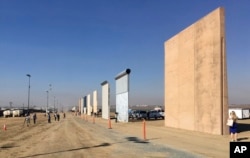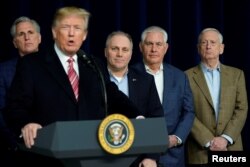U.S. President Donald Trump reiterated Saturday that he would not support legislation to protect hundreds of thousands of immigrants from deportation unless it included funding for a border wall and eliminates the visa lottery program and extended-family-based immigration.
"We all want DACA to happen, but we also want great security for our country," Trump said of the Deferred Action for Childhood Arrivals program, which expires in March.
The administration has a 10-year, $18 billion plan to build a wall, something deeply unpopular with Democrats, especially when tied to DACA.
“We hope that we’re going to be able to work out an arrangement with the Democrats,” he said said Saturday. “It’s something, certainly, that I’d like to see happen.”
Trump spoke as he met with Republican lawmakers and members of his Cabinet to establish the administration's 2018 legislative priorities and to devise a strategy for midterm elections in November. They were gathered at the Camp David presidential retreat in Maryland.
"We went into DACA and how we're going to do it, and we hope that we're going be able to work out an arrangement with the Democrats. I think it's something that they'd like to see happen," Trump told reporters.
In September, Trump rescinded DACA, which was instituted by former President Barack Obama. It protected nearly 800,000 immigrants from deportation, allowing them to legally live and work in the United States.
Trump gave Congress until March 5 to agree on legislation that would allow equivalent protections to those offered under DACA, provided the measure included funding for a wall along the border with Mexico, ended the visa lottery program, and ended extended-family-based immigration, in which immigrants from a particular area follow others from that area to specific U.S. cities or neighborhoods.
Trump also said the drug crisis in America had reached unprecedented levels and vowed his administration would make a "big dent" in resolving the problem this year.
"One of the things we are discussing very powerfully is drugs pouring into this country and how to stop it, because it's at a point over the last number of years ... it's never been like this," he said.
Trump said the drug problem is less difficult to deal with in countries that "take it very seriously, and they're very harsh" — an apparent signal the U.S. is preparing to take a much tougher approach.
"We are going to be working on that very, very hard this year, and I think we're going make a big dent into the drug problem," he said.
Trump said the Republican leaders also discussed the nation's infrastructure needs and a variety of military issues.
Senate Majority Leader Mitch McConnell of Kentucky, who was among those in attendance, did not elaborate on priorities for the the new year. But he told reporters 2017 would be "a tough year to top" and added, "If you are like those of us here at the podium, you'd like to see America be a right-of-center country."
House Speaker Paul Ryan said rebuilding the nation's infrastructure and bolstering the military would be priorities this year, as well as ensuring "that everyone enjoys the economic growth that's to come."
Republican legislative priorities also will include the budget, welfare reform and the midterm elections.
Trump appeared Saturday to back away from efforts to overhaul the welfare system. McConnell had argued that welfare reform was a no-go given Democratic opposition. And Trump appeared to have come around.
Additionally, Republicans have been eager to cut benefit programs like welfare and food stamps.
Congress must work quickly, however, to approve a funding plan by January 19 to avoid a government shutdown.
Republican priorities could be stopped in their tracks if the Democrats are successful during the midterm elections.
Trump has been facing increasing criticism about his presidential style. He begins the new year with the release of a bombshell book, Fire and Fury by Michael Wolff, that describes the president as being like a child and in need of psychiatric help.
It remains to be seen how the book and other accounts of Trump's mental status will affect the upcoming elections.
All 435 members of the House and one-third of the 100 members of the Senate will be up for re-election in 2018.








